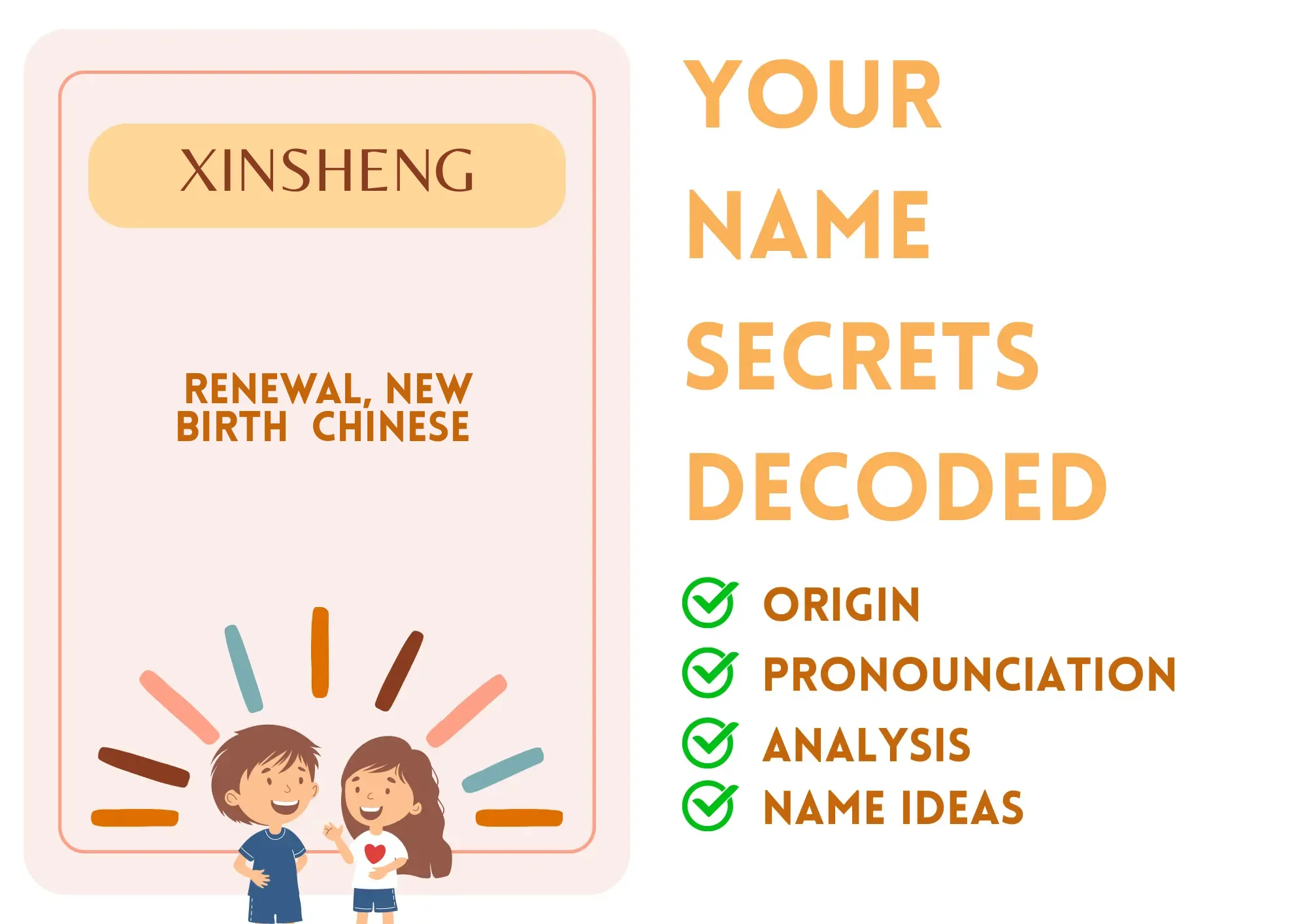
Xinsheng
Xinxing is a captivating name with rich meanings and cultural significance rooted in Chinese heritage. The name translates to 'renewal' or 'new birth.' It encapsulates the themes of growth and transformation, making it a favorable choice symbolizing hope and new beginnings. Primarily used in China and among Chinese-speaking communities, it is traditionally a masculine name but can be considered unisex.
In Chinese culture, Xinsheng symbolizes the essence of renewal and vitality, often associated with the natural cycle of life. Historically, it is appreciated for evoking connotations of rebirth and rejuvenation, making it a well-regarded name in various contexts.
In popular culture, Xinsheng might be less commonly featured than other names, but it conveys a sense of positivity and freshness. The name is often met with favorable impressions for its phonetic beauty and profound meaning.
Basic Information
Gender: Unisex
Sounds Like: SHIN-sheng
Pronunciation Explanation: The first syllable 'SHIN' sounds like 'sin,' and the second syllable 'sheng' rhymes with 'sung.'
Summary and Meaning
Meaning: renewal, new birth (Chinese)
Origin: The name Xinsheng has Chinese origins, deeply rooted in the language and culture of China.
Usage: Xinsheng is considered unisex, used for both boys and girls in modern contexts.
Name Number (Chaldean)
Name Number (Pythagorean)
Popularity (Global Rank)
Overall: 183029
Boys: 54235
Girls:
Most Popular in
Religious and Cultural Significance
Religion: Buddhism
Background: While not directly linked to a specific religious doctrine, the themes of renewal resonate in Buddhist philosophies of reincarnation and the cyclical nature of life.
Cultural Significance: Xinsheng is favored for its positive connotations related to growth and transformation, making it a meaningful choice during significant life events.
Historical Significance: The concept of renewal is significant in Chinese philosophy and culture, representing hope and a fresh start—an important aspect during festivals and rites of passage.
Popular Culture
Literature and Mythology: While less common in traditional literature, the themes connected to Xinsheng resonate in many Chinese folktales focusing on rebirth and renewal.
Movies and Television: Characters embodying qualities of rebirth and transformation may carry names similar to Xinsheng, depicting journeys of growth and renewal.
Feelings and Perceptions
Perception: Xinsheng is generally viewed positively, evoking feelings of optimism, freshness, and new beginnings; people appreciate its depth.
Positive Feelings: Hopeful, fresh, vibrant, connected to life cycles, positive, renewing.
Negative Feelings: Could be viewed as unusual by those unfamiliar with Chinese naming conventions.
Practical Considerations
Ease of Writing and Calling: The name Xinsheng is easy to pronounce for those familiar with Mandarin phonetics but may challenge those unfamiliar with tonal languages. It has a straightforward spelling.
Common Typos and Misspellings: Sinsheng,Xinshang,Xinseng,Xinshi
Common Nicknames: Sheng,Shin,Xin
Xinsheng Popularity
Xinsheng Usage and Popularity By Country
| Country | Rank (Overall) |
|---|---|
| Australia | 42971 |
| Singapore | 53638 |
| Italy | 69345 |
| United States | 69718 |
| Netherlands | 70785 |
| France | 72677 |
| Malaysia | 93908 |
| Canada | 96992 |
| Philippines | 100268 |
| United Kingdom | 118019 |
Xinsheng Usage and Popularity By City
| City | Rank (Overall) |
|---|---|
| Peking | 2761 |
| Shanghai | 5107 |
| Dallas | 21636 |
| College Station | 2347 |
| Seattle | 17340 |
| Shenzhen | 3542 |
| Suzhou | 1329 |
| Los Angeles | 32564 |
Compatibility Analysis
Famous Persons Named Xinsheng
Related Names
Similar Sounding Names:
Xian,Xinyu,Xinyi,Xing
Similar Meaning and Related Names:
Sibling Name Ideas (Brothers):
Ling ♂️
Buddhism, Taoism
Sibling Name Ideas (Sisters):
Huan ♂️
None specific